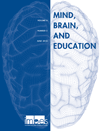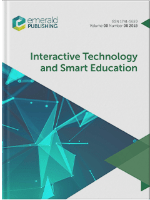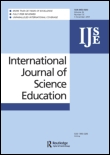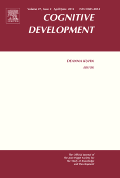
Trends in Neuroscience and Education
Scope & Guideline
Transforming Learning Through Neuroscientific Insights
Introduction
Aims and Scopes
- Educational Neuroscience Integration:
The journal emphasizes the integration of neuroscience findings into educational practices, aiming to inform teaching methods and learning environments based on empirical evidence. - Cognitive and Executive Function Studies:
A core area of research involves the exploration of cognitive processes and executive functions, particularly how these relate to learning, development, and educational outcomes in diverse populations. - Teacher Training and Development:
The journal consistently focuses on improving teacher education through the application of neuroscience, addressing neuromyths, and promoting scientifically grounded pedagogical strategies. - Assessment and Evaluation Techniques:
Research includes innovative methodologies for assessing learning experiences and outcomes, utilizing technologies like eye-tracking and neuroimaging to enhance educational assessments. - Child Development and Learning Practices:
The journal covers studies on child development, particularly in early education, investigating how various factors like play, physical activity, and emotional processing influence learning.
Trending and Emerging
- Interdisciplinary Approaches to Learning:
There is an increasing trend towards interdisciplinary research that combines neuroscience, psychology, and education to develop comprehensive frameworks for understanding learning processes. - Technology in Education:
The use of technology, including neurotechnology and data analytics, is gaining prominence, with studies exploring how these tools can enhance learning experiences and outcomes. - Focus on Lifelong Learning and Adult Education:
Recent publications indicate a shift towards understanding learning across the lifespan, with emerging research on adult education and professional development informed by neuroscience. - Neuroscience Literacy for Educators:
The trend towards improving neuroscience literacy among educators is growing, emphasizing the need for teachers to understand and apply scientific findings in their instructional practices. - Social and Emotional Learning (SEL):
Research focusing on the intersection of cognitive processes and social-emotional factors in learning is on the rise, highlighting the importance of SEL in educational contexts.
Declining or Waning
- Traditional Neuromyths:
Research on traditional neuromyths seems to be waning, as the focus shifts towards more nuanced understandings of neuroscience in education rather than debunking myths. - General Studies on Learning Styles:
There is a noticeable decline in studies centered around specific learning styles, as the field moves towards more comprehensive, evidence-based approaches to learning and instruction. - Single-Domain Interventions:
Research focusing solely on single-domain interventions without considering the interplay of cognitive, emotional, and social factors in learning is becoming less prominent, as holistic approaches gain traction.
Similar Journals

Malaysian Journal of ELT Research
Exploring New Frontiers in English Language PedagogyMalaysian Journal of ELT Research is a pioneering platform dedicated to advancing the field of English Language Teaching (ELT) research, published by the Malaysian English Language Teaching Association. With an ISSN of 1511-8002, this journal serves as a vital resource for educators, researchers, and practitioners who are passionate about enhancing English language instruction in Malaysia and beyond. Although specific impact factors are currently not available, the journal's commitment to quality research is evident in its rigorous peer-review process, fostering innovative studies that address contemporary challenges in ELT. The journal embraces a wide range of topics within English language pedagogy, including but not limited to curriculum development, teaching methodologies, and language assessment. It provides an open-access model, ensuring that valuable research insights are readily accessible to a global audience. With its strategic focus on enriching English language education, the Malaysian Journal of ELT Research stands as an important contributor to scholarly discourse in the realm of language teaching and learning.

Journal of Baltic Science Education
Connecting Researchers and Practitioners in Science EducationThe Journal of Baltic Science Education, with ISSN 1648-3898, is a leading academic journal published by the SCI METHODICAL CENTRE - SCI EDUCOLOGICA in Lithuania. This esteemed journal, established in 2008, has gained recognition within the educational sector, boasting a notable impact factor that places it in the Q2 category for the year 2023, highlighting its significance in advancing educational research. With Scopus rankings reflecting a commendable placement at #659 out of 1543 in the Education category, the journal serves as a vital platform for disseminating knowledge and fostering discourse among researchers, professionals, and students in the field of science education across the Baltic region and beyond. The journal’s objectives include promoting innovative educational practices, sharing empirical research findings, and contributing to the development of effective science teaching methodologies, ensuring that it remains at the forefront of academic inquiry in education.

Mind Brain and Education
Transforming Education Through Cognitive InsightsMind, Brain, and Education is a pioneering journal published by WILEY, focusing on the intersection of cognitive neuroscience, developmental psychology, and educational practices. With an ISSN of 1751-2271 and E-ISSN 1751-228X, this esteemed publication offers a platform for researchers and educators to disseminate innovative findings that bridge theory and practice in learning environments. Spanning from 2008 to 2024, the journal has established a reputation as a vital resource in the academic community, recognized in 2023 as Q2 in Developmental and Educational Psychology and Education, and Q3 in Cognitive Neuroscience and Experimental and Cognitive Psychology. With Scopus ranks demonstrating its impact, especially in Education and Psychology fields, Mind, Brain, and Education invites submissions that advance knowledge and application of educational strategies informed by brain science. Researchers, professionals, and students will find critical insights and collaborative opportunities to enhance educational outcomes and cognitive development in learners.

npj Science of Learning
Empowering Educators with Cutting-edge Research in Learningnpj Science of Learning is a premier, open access journal published by NATURE PORTFOLIO, focusing on the interdisciplinary exploration of learning processes associated with developmental neuroscience and education. Since its inception in 2016, this journal has established itself as a crucial platform for disseminating impactful research, evidenced by its impressive Q1 ranking in Education and Q2 ranking in Developmental Neuroscience as of 2023. Based in the United Kingdom, the journal’s scope encompasses innovative studies that bridge the gap between neuroscience findings and educational practices, making it essential reading for educators, neuroscientists, and scholars alike. With a commitment to advancing knowledge in these fields, npj Science of Learning provides a vital resource that supports both theoretical advancements and practical applications, ensuring that researchers and practitioners can access the latest findings that inform effective learning strategies.

Interactive Technology and Smart Education
Advancing knowledge in the realm of interactive learning.Interactive Technology and Smart Education is a leading academic journal published by EMERALD GROUP PUBLISHING LTD, dedicated to exploring the dynamic intersection of technology and education. With a robust impact factor signifying its significant contributions to the field, this journal consistently ranks in the Q1 quartile in categories such as Computer Science (Miscellaneous), Education, and E-learning, reflecting its prestige and wide-ranging influence. A staple for researchers, educators, and industry professionals, the journal addresses innovative practices and developments in interactive technologies that enhance teaching and learning experiences. Operating from its base in the United Kingdom, the journal spans nearly two decades of impactful publishing, featuring high-quality research that plays a crucial role in shaping the future of education through technology. Scholars seeking to stay at the forefront of this evolving field are encouraged to contribute and engage with the journal's pioneering work.

INTERNATIONAL JOURNAL OF SCIENCE EDUCATION
Advancing Science Learning Through Innovative ResearchINTERNATIONAL JOURNAL OF SCIENCE EDUCATION, published by Routledge Journals, Taylor & Francis Ltd, is a leading academic journal that plays a pivotal role in the field of science education. Established in 1987, this esteemed journal aims to advance the understanding of educational processes and practices in the sciences, showcasing innovative research that intersects pedagogy, curriculum development, and educational policy. With a prestigious Q1 ranking in Education for 2023 and an impressive Scopus rank of 304 out of 1543 in the Social Sciences Education category, the journal represents the top tier of scholarly impact and influence. Although it is not an open-access journal, the findings and insights shared within its pages are of paramount importance for researchers, educators, and policymakers striving to enhance science learning in diverse educational contexts. With a commitment to excellence and a vision to inform and inspire, the INTERNATIONAL JOURNAL OF SCIENCE EDUCATION is a vital resource for anyone dedicated to the future of science education.

Journal of Cognitive Enhancement
Elevating Understanding in Behavioral and Experimental Psychology.Journal of Cognitive Enhancement, published by SpringerNature, is a premier academic platform dedicated to advancing knowledge in the fields of Cognitive Neuroscience, Behavioral Neuroscience, and Experimental Psychology. With an electric combination of rigorous research and innovative practice, this journal has established itself as an essential resource for researchers, professionals, and students interested in understanding the mechanisms behind cognitive enhancement and its implications for mental health and cognitive function. As of 2023, it is recognized in the Q2 and Q3 quartiles across several categories, demonstrating its solid impact in the academic community, particularly with an impressive Scopus ranking of #27/76 in Neuropsychology and Physiological Psychology. Operating in a competitive landscape, the Journal of Cognitive Enhancement fosters open dialogue and collaboration through valuable contributions to cognitive research, facilitating insights that are crucial for practical applications in clinical and educational settings. While specific open access options are currently not defined, we encourage all interested scholars to explore the rich database of published works dating from 2017 to 2024, contributing to this dynamic field of study.

COGNITIVE DEVELOPMENT
Bridging Theory and Practice in Cognitive StudiesCognitive Development is a prestigious academic journal published by Elsevier Science Inc, focusing on the critical area of developmental and cognitive psychology. With an ISSN of 0885-2014 and an E-ISSN of 1879-226X, this journal serves as a vital platform for the dissemination of innovative research, theories, and methodologies from 1986 to the present, with the latest articles contributing to a comprehensive understanding of cognitive processes in children and adolescents. Positioned in the second quartile (Q2) of both the Developmental and Educational Psychology and Experimental and Cognitive Psychology categories, Cognitive Development holds an essential place in shaping contemporary psychological research, boasting robust Scopus rankings of #175/360 and #90/165 in its respective fields. Though not an open-access journal, it provides valuable insights and rigorous studies essential for researchers, professionals, and students engaged in the intricate processes of cognitive development. Whether you're looking to publish significant findings or simply stay updated on the latest advancements, Cognitive Development is an indispensable resource in the psychological community.

Metacognition and Learning
Fostering Innovation in Education and Cognitive PsychologyMetacognition and Learning is a premier academic journal published by Springer, dedicated to advancing research in the fields of education and cognitive psychology. Since its inception in 2006, this journal has consistently maintained a prestigious position, achieving a Q1 ranking in Education for 2023, underscoring its influential role in the dissemination of innovative ideas and empirical findings. With an ISSN of 1556-1623 and E-ISSN of 1556-1631, it provides a vital platform for scholars to explore the intricate relationships between metacognitive processes and learning outcomes, thereby enriching pedagogical practices and educational strategies. Although it is not open access, the insights offered in its publications are invaluable for researchers, educators, and practitioners who seek to enhance learning and teaching through a deep understanding of metacognition. The journal is headquartered in New York, United States, at One New York Plaza, Suite 4600, where it continues to foster a vibrant community of learning enthusiasts and contribute significantly to the academic landscape through its robust editorial standards and diverse contributions.

Ensenanza de Las Ciencias
Transforming Education with Insightful Scientific MethodologiesEnsenanza de Las Ciencias is a leading academic journal dedicated to the field of education, with a particular focus on the methodologies and practices involved in teaching sciences. Published by Universitat Autònoma de Barcelona, this journal is on a mission to disseminate innovative research and pedagogical strategies that enhance scientific education. Since adopting an Open Access model in 2010, Ensenanza de Las Ciencias has become increasingly accessible to a global audience, facilitating the exchange of knowledge among researchers, educators, and students. With its ISSN 0212-4521 and E-ISSN 2174-6486, the journal boasts an impressive impact, ranking in the Q2 category for education as of 2023 and securing a respectable 49th percentile ranking in Scopus among Social Sciences - Education publications. The journal's converged years, spanning from 2009 to 2024, highlight its ongoing commitment to advancing educational practices. In an ever-evolving academic landscape, Ensenanza de Las Ciencias plays a crucial role in shaping future educators and fostering a deeper understanding of science education in Spain and beyond.